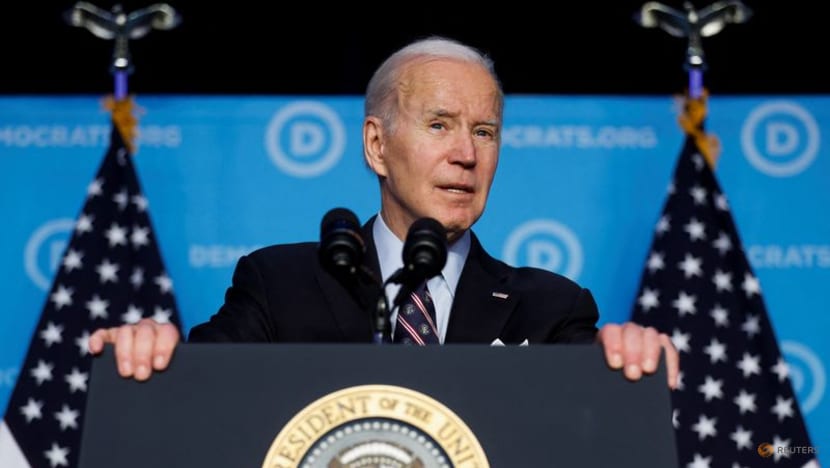 |
| FILE PHOTO: U.S. President Joe Biden delivers remarks to the Democratic National Committee (DNC) Winter Meeting in Washington, U.S., March 10, 2022. REUTERS/Jonathan Ernst |
11 Mar 2022
WASHINGTON: President Joe Biden will move on Friday (Mar 11) to revoke Russia's "most favoured nation" trade status, joining with allies to punish Moscow over its invasion of Ukraine.
Biden will announce the plans at the White House at 10.15 am.
The White House said Biden would announce "actions to continue to hold Russia accountable for its unprovoked and unjustified war on Ukraine". Russia calls its actions in Ukraine a "special operation".
The administration will revoke Russia's "most favoured nation status" over its invasion of Ukraine, US House Speaker Nancy Pelosi said at a news conference earlier on Friday.
Stripping Russia of its favoured nation status paves the way for the United States and its allies to impose tariffs on a wide range of Russian goods, which would further ratchet up pressure on an economy that is already heading into a "deep recession".
The coordinated moves by Washington, London and other allies come on top of a host of unprecedented sanctions, export controls and banking restrictions aimed at pressuring Russian President Vladimir Putin to end the largest war in Europe since World War II.
Each country must implement the change in Russia's trading status based on its own national processes, administration sources said.
In the United States, removing Russia's "Permanent Normal Trade Relations" (PNTR) status will require an act of Congress, but lawmakers in both houses - and on both sides of the political aisle - have already signalled their support.
The White House will work with lawmakers on legislation to revoke Russia's status, administration sources said.
Unprecedented, sweeping sanctions slapped on Russia's banks and elites, along with export controls on a raft of technologies, have already caused the Russian economy to crater, and the International Monetary Fund is now predicting that it will plunge into a "deep recession" this year.
In 2019, Russia was the 26th largest goods trading partner of the United States, with some US$28 billion exchanged between the two countries, according to the US Trade Representative's office.
Top imports from Russia included mineral fuels, precious metal and stone, iron and steel, fertilizers and inorganic chemicals, all goods that could face higher tariffs once Congress acts to revoke Russia's favoured nation trade status.
The coordinated moves by Washington, London and other allies come on top of a host of unprecedented sanctions, export controls and banking restrictions aimed at pressuring Russian President Vladimir Putin to end the largest war in Europe since World War II.
Each country must implement the change in Russia's trading status based on its own national processes, administration sources said.
In the United States, removing Russia's "Permanent Normal Trade Relations" (PNTR) status will require an act of Congress, but lawmakers in both houses - and on both sides of the political aisle - have already signalled their support.
The White House will work with lawmakers on legislation to revoke Russia's status, administration sources said.
Unprecedented, sweeping sanctions slapped on Russia's banks and elites, along with export controls on a raft of technologies, have already caused the Russian economy to crater, and the International Monetary Fund is now predicting that it will plunge into a "deep recession" this year.
In 2019, Russia was the 26th largest goods trading partner of the United States, with some US$28 billion exchanged between the two countries, according to the US Trade Representative's office.
Top imports from Russia included mineral fuels, precious metal and stone, iron and steel, fertilizers and inorganic chemicals, all goods that could face higher tariffs once Congress acts to revoke Russia's favoured nation trade status.
Source: Reuters/yb
No comments:
Post a Comment
Please note that this is a "news clipping" blog. Articles may have been authored elsewhere and "clipped" to this blog for ease of reference. The blog "owner" is usually not the author and does not have any means of relaying your comments or questions to the author or authors.
Comments that will drive discussion and explore issues may be kept. Other comments may be deleted.